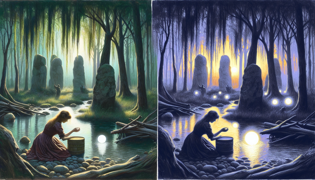The Pachamama’s Blessing
Reading Time: 9 min

About Story: The Pachamama’s Blessing is a Myth Stories from bolivia set in the Ancient Stories. This Descriptive Stories tale explores themes of Nature Stories and is suitable for All Ages Stories. It offers Cultural Stories insights. A Peruvian Myth of Earth's Mother Nurturing the Andean Harvest.
Introduction
High in the Andes, long before dawn painted the peaks of Illimani and Sajama, Quechua families gathered at the edge of terraced fields that rolled like emerald carpets. They brought clay pots warm from hearths, their sides slick with the earthy aroma of fermented chicha. The air tasted of coca leaf and crisp mountain wind, promising both hardship and fertility.
As the first pink fingers of sunrise caressed ancient stone, an elder named Amaru knelt before a shallow crack in the earth. Its dark mouth whispered secrets like a mother’s lullaby, drawing him closer than the beat of his own heart. He could feel the soil’s pulse beneath his calloused palm, softer than a newborn’s cheek, trembling with life.
Around him, women draped in lliclla shawls hummed prayers, their voices braided as tightly as quinoa stalks swaying in a gentle breeze. Each word fell like a droplet of water into a chalchihuite cup, glinting emerald in the dim light. The distant echo of a quena flute fluttered through the valley, bright and haunting.
After seasons of sparse rains, anxiety clung to the villagers like cold dew. Some joked they were menos que perro sin pulgas, but most felt más perdido que turco en la neblina. They knew that without Pachamama’s favor, even the strongest roots might wither. Yet they refused to resign themselves to drought or despair.
They would honor the earth mother with offerings at the ch’alla: coca leaves laid in spirals, llama fat pressed into golden nuggets, candles burning like captured suns. Even when supplies were scant and hunger crept silently through households, no one would say they were en olla. Faith, they believed, would coax life back from the stones.
Origins of the Harvest Ritual
In the time before tall wheat and maize bent heavy in the breeze, the land was a silent witness to each struggle. According to elders, a shepherd named Qori spent his nights among his herd, listening to the murmur of stones and the restless hum of condors. One evening, he stumbled upon a hollow chamber carved into a cliff face, its mouth framed with ancient carvings depicting women crowned with quinoa. He felt a pull as gentle as twilight’s hush, guiding him inside.

The chamber was cool as a glacier’s breath and smelled of damp earth and distant thunder. Ribbons of sunlight slanted through a crack overhead, illuminating a stone altar etched with concentric circles that echoed the shape of the moon. Qori traced a finger over the grooves and felt warmth like a mother’s embrace. Deep within, a voice as steady as knotted roots spoke of gratitude and unity. It taught him that offerings of coca, corn, and llama fat were not mere gifts but promises, weaving humans back into the tapestry of Pachamama’s embrace.
Qori returned to his village carrying seeds carefully wrapped in llama wool, each kernel a promise for tomorrow. He taught his people how to hollow a space at the base of a terrace wall, pour chicha into the earth’s veins, and crown the opening with woven bands of wool dyed red like the heart’s ember. As the villagers chanted, the earth quivered, exhaling the scent of fresh rain on dusty soil. From that moment, a bond was forged, as enduring as the Andean peaks themselves.
Generations later, descendants still recall Qori’s vision. Each year, at the first bloom of the quinoa flower, they retrace his steps. Women in colourful polleras hum lullabies while men beat drums whose low thrum rattles hearts like distant thunder. As dawn breaks, the smoke of roasted coca leaves curls skyward, carrying prayers beyond sight. Local folk say that when the earth mother is pleased, she hums in return, a vibration felt deep in marrow and marrow alone.
Thus was born the harvest ritual, a living symphony that echoes through time. It reminds every man, woman and child that Pachamama’s bounty depends on respectful reciprocity. The mountains may watch in silent majesty, but the ritual’s living chords ensure her heart still beats beneath every furrow.
Trials and Offerings
When storms gathered like restless spirits above the peaks, the ritual deepened. Rainclouds rolled in from the west, their edges glowing silver against cobalt sky. The village braced itself, wrapping llamas in thick blankets of alpaca wool and barricading doorways with woven reeds. The earth underfoot felt alive, vibrating as if Pachamama herself trembled at each clap of thunder.

Amid this tension, the village council met under an ancient polylepis tree, its bark peeling like old parchment. Elders debated whether to sacrifice their last llama, a gesture of utmost devotion, or risk angering the earth mother. In a voice roughened by years of chanting, Mamá Huayna declared that every offering must come from the heart. "No hay paja que el diablo no empape."
At dusk, torches were lit around a stone altar carved with serpents and condors. Families approached in solemn procession, carrying bowls of llama fat heated until they glowed like molten amber. They dipped candles in the fat, then placed them atop the altar, their flickering flames dancing like captive fireflies. The scent of burning fat mixed with the metallic tang of ozone, and distant echoes of a charango strummed a rhythm that matched the pounding in every breast.
Children watched wide-eyed as the earth beneath the altar shuddered. A faint hiss rose from the fissure, as if the soil were exhaling. Villagers dropped handfuls of pink and yellow corn into the glowing chasm, each kernel a silent prayer for rain and abundance. The wind carried their words: "Pachamama, madre, escucha nuestra voz."
Through the night, they munched on toasted kernels, their teeth clacking in the dark. A cold mist settled, coating the altars in crystalline beads that glinted under torchlight. Every chant, every bead of sweat, every beat of the drum was an offering in itself. They poured their fears and hopes into the earth, trusting that the trial would become triumph.
By dawn, the storm had passed as quietly as it arrived. The clouds lifted, revealing a sky as pure as polished lapis lazuli. Tiny puddles shimmered in the furrows, and soft new shoots pressed through damp soil, like fledglings daring to fly. The villagers embraced, relief washing over them like gentle spring rain. Their offerings had been accepted, and Pachamama’s favor was renewed.
Pachamama’s Blessing Unveiled
As sunlight spilled over the ridge, fields of quinoa and corn stretched out like gold-flecked waves. Every furrow glistened with dew, each leaf cradling droplets for the new day. The villagers emerged barefoot, feeling the earth’s soft pulse beneath their feet, tender as a mother’s sigh. They approached the main plaza, where fresh bundles of coca leaves lay in spirals around a steaming mound of earth.

Amaru led the final ceremony, his voice as clear as mountain ice. He scattered bright petals of totora flowers around the mound, their fragrance drifting like a promise. Women weaved wreaths of wheat and barley stalks, their fingers calloused yet gentle, as if shaping blessings with every twist. The children, eyes wide, danced in slow steps, casting handfuls of crushed coca into the air like confetti.
At his signal, the villagers placed torches around the mound and lit them. Flames licked the air, crackling against the morning hush. As the earth steamed, a faint humming arose, as though the ground were singing in gratitude. A warm breeze skimmed across the barley stalks, rustling them like applause from the mountains themselves.
Then the sky split open. A single beam of light touched the mound and spread outward, illuminating every face. In that moment, each villager felt Pachamama’s breath upon their cheek, soft as llama fur. The soil glowed with renewed vigor; colors sharpened as though painted with the purest pigments. Even the stones seemed to glow from within.
Tears flowed freely as the harvest lay before them in promise. Corn tassels nodded in the breeze, quinoa heads bent under their own weight. The villagers offered a final prayer: gratitude woven into each syllable, as sincere as the first dawn. A child laughed, the sound tinkling like bells, and the earth mother’s blessing settled in every heart.
Thus the valley thrived for many seasons. The ritual endured, a living thread binding humanity to the earth. Though storms may gather again, and drought may come singing like a sigh, the people know their promise remains unbroken: to honor Pachamama, in life and in the silent moments when the soil speaks back.
Conclusion
Years have rolled down the mountain slopes like rivers, yet the harvest ritual remains untarnished. Today's families still kneel beside the crack in the earth, their hands trembling with reverence as they press coca and chicha into the soil’s hidden heart. Each offering is a tender echo of Qori’s first prayer, a vow that communities will never stray too far from the roots that nourish them. In moments of feast or need, they recall the trials beneath gathering clouds and the hush that fell when Pachamama’s breath warmed the valley. The stones, ancient and knowing, bear silent witness to every whispered petition and every jubilant cheer. Even as modern life edges closer—tractors replacing llamas, wind turbines rising above ridges—the ritual endures, unbowed by time.
In every flicker of candlelight, in every grain of corn that leaps from the stalk, there is the unmistakable presence of the earth mother. She courses through the quinoa fields as surely as rivers carve their paths, tender yet unyielding. Grandmothers hum the old songs while grandchildren, cheeks flushed with excitement, scatter petals at the ritual’s crown. The wind carries their voices across the Andean heights, where condors wheel in the azure expanse. It is here, in this embrace of past and future, that Pachamama’s blessing finds its purest home—alive in every heartbeat, every harvest, and every promise kept under the wide sky of Bolivia.
May this tale travel with you as surely as the llama caravans traversed mountain passes. Remember that every handful of earth you hold holds the spirit of Pachamama, waiting for your gratitude to breathe hope back into her veins. And when you feel the soil’s pulse beneath your feet, listen closely—it may just whisper your own blessing back to you, as unwavering as the Andean peaks above.

















